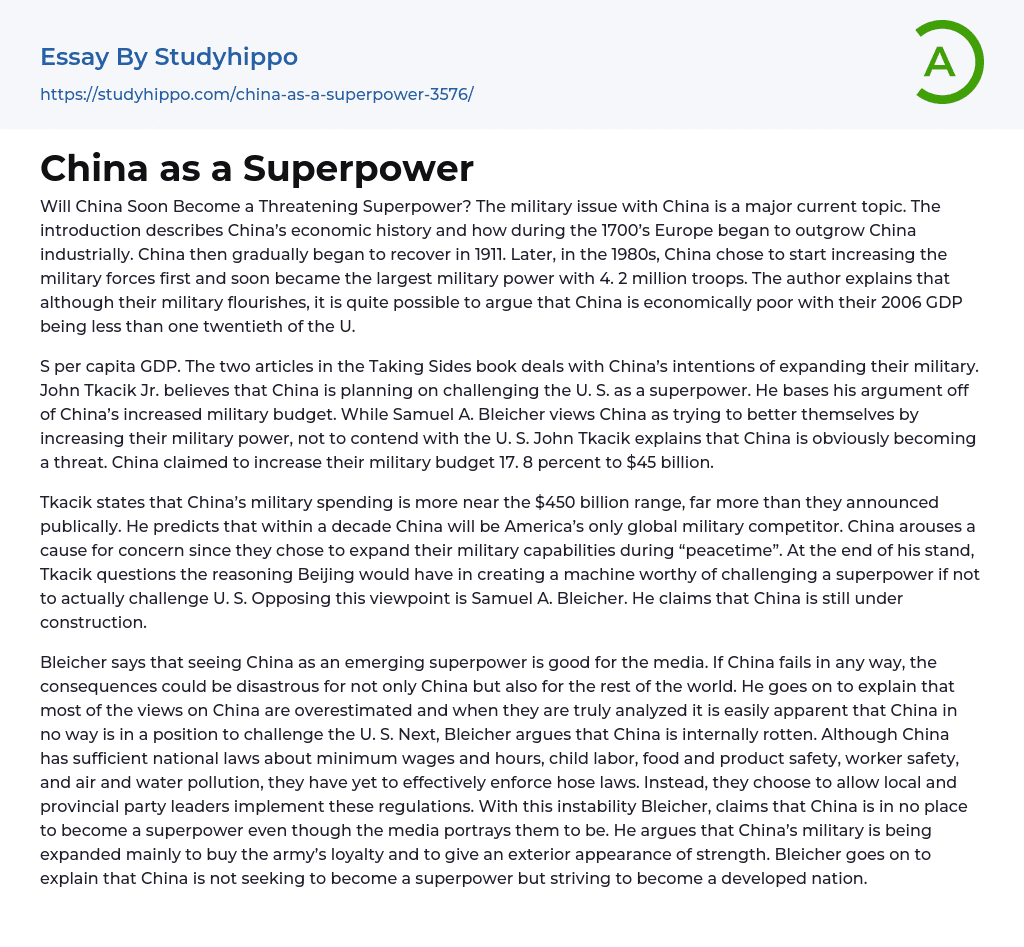China's potential as a threatening superpower is a major concern, particularly in terms of their military capabilities. The text discusses China's economic history and how they were surpassed by Europe industrially in the 1700s. However, China began to recover by 1911 and decided to prioritize military expansion in the 1980s. This led them to quickly become the world's largest military power with an impressive 4.2 million troops. Despite their military might, the author argues that China's economic situation remains relatively poor, as their GDP in 2006 was less than one twentieth of the U.S.
In the Taking Sides book, there are two articles that both discuss China's military expansion. John Tkacik Jr. argues that China has intentions of challenging the U.S. as a superpower and supports this claim by pointing out their increased military budget. On the other hand, Samuel A. Bleicher
...believes that China aims to strengthen itself through enhancing its military power rather than engaging in competition with the U.S. Tkacik states that China's threat is evident due to their announcement of a 17.8 percent increase in their military budget, which amounts to $45 billion.
Tkacik suggests that China's military spending is around $450 billion, a figure much larger than what China has publicly stated. Tkacik also predicts that within ten years, China will be the only global military competitor to the United States. This raises concerns as China is investing in expanding its military capabilities during peacetime. Tkacik questions Beijing's motives for developing a military force that can challenge a superpower like the United States. On the other hand, Samuel A. Bleicher argues that China is still undergoing development.
According to Bleicher, perceiving China as
an emerging superpower is beneficial for the media, as any failure in China could have disastrous consequences globally. He further explains that most of the opinions on China are exaggerated, and a thorough analysis reveals that China is not capable of challenging the U.S. In addition, Bleicher asserts that China is internally corrupt. Although they have laws regarding minimum wages, child labor, food and product safety, worker safety, and environmental pollution, these laws are not effectively enforced. Instead, local and provincial party leaders are responsible for implementing these regulations. Given this instability, Bleicher argues that China is not in a position to become a superpower, despite the portrayal by the media. He claims that China's military expansion is mainly aimed at securing army loyalty and presenting a facade of strength. Moreover, Bleicher explains that China's objective is not to become a superpower but rather to become a developed nation.
- Federal government essays
- Armed Forces essays
- Confederate States Of America essays
- Federal Government Of The United States essays
- Fourteenth Amendment To The United States Constitution essays
- Governance essays
- Parliament essays
- Politics essays
- Jurisdiction essays
- Bureaucracy essays
- Separation Of Powers essays
- Congress essays
- President essays
- United States Congress essays
- Non-Commissioned Officer essays
- Appeal essays
- Revenge essays
- Corporate Governance essays
- Public Service essays
- Income Tax essays
- Supply essays
- Red Cross essays
- Democracy essays
- State essays
- Liberty essays
- Absolutism essays
- Reform essays
- Republic essays
- John Marshall essays
- Bourgeoisie essays
- Developed Country essays
- Elections essays
- International Relations essays
- Left-Wing Politics essays
- Monarchy essays
- Political Corruption essays
- Political Party essays
- Political Science essays
- Sovereign State essays
- United Nations essays
- World Trade Organization essays
- Contras essays
- Dictatorship essays
- Foreign policy essays
- Monarch essays
- Corruption essays
- Foreign essays
- Democratic Party essays
- European Union essays
- President Of The United States essays




